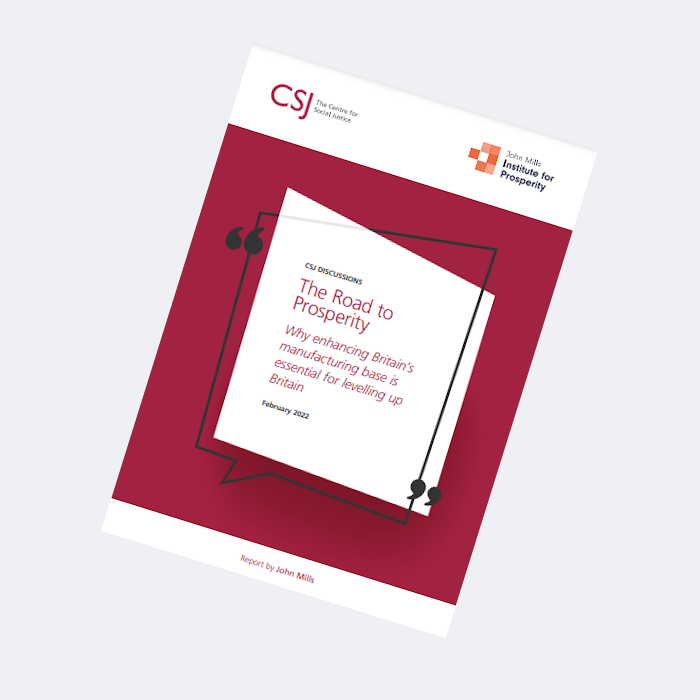
A new discussions paper has been published this week in a collaboration between the Institute for Prosperity (JMI) and the Centre for Social Justice (CSJ) on UK economic policy. Entitled The Road to Prosperity, the paper details how the Government can increase economic growth and create jobs in the regions outside of London and the South East.
In the paper, John Mills, founder of the Institute of Prosperity, argues that the only way to boost productivity in the places that have experienced stalled growth and stagnant wages over the last two decades and beyond, the UK’s so-called ‘left-behind’ areas, is by reviving the UK manufacturing sector.
A central argument of the paper is that manufacturers in Britain, in comparison to those like Singapore or Germany, are uniquely challenged by the country’s uncompetitive exchange rate. Mills argues that because the value of sterling is so high, British exports are not competitive enough on the world stage, leaving left-behind parts of the country without anything to sell the rest of the world.
The Road to Prosperity urges the Government to take targeted action on the UK exchange rate with a view to boosting UK manufacturing and growth. Mills argues that without this targeted action, the UK manufacturing sector will continue to suffer, leading to stagnant productivity and continually low economic growth.
It also argues that boosting UK manufacturing and GDP growth is the key to finding the funds to tackle the mounting problems of climate change, health and social care, pensions, education, and training. Without higher levels of GDP growth, our public services will face increasing pressure, while we continue to lose our share of world trade.
John Mills, author of the paper, said: “The UK is one of the most regionally unequal countries in the industrialised world. We have historically relied too much on services based in London and the South East to prop up our economy while other areas of the UK are left with much too little to sell to the rest of the world. This must change if we are going to fix Britain’s economic divide.”
“We used to have a proud British manufacturing sector. Now our industrial heartlands have been hollowed out by successive governments, leaving them lacking in jobs, opportunities, and with stagnant or declining living standards. To reverse this, the Government must take steps to bring manufacturing and prosperity back to these left-behind regions, and this paper provides recommendations for how to do that.”
Gavin Rice, Policy Director at the Centre for Social Justice, said: “John Mills’s paper is an important intervention into the debate about levelling up. At the CSJ, we share the view of the JMI that getting the growth rate up and boosting British manufacturing should be a priority for the Government.
“The Government has rightly attributed the root cause of our regional disparities – among the largest in the industrialised world – to our enormous productivity gap. This causes slow and unequal growth, stunted wages and frozen living standards. While London has accelerated away, every other UK region is less productive than the national average, and in relative terms has fallen further and further behind.”
The Centre for Social Justice is a UK-based think tank that campaigns to put social justice at the heart of British politics. The CSJ’s vision is for those living in the poorest and most disadvantaged communities across Britain to be given every opportunity to flourish and reach their full potential.
Founded in 2020, the Institute for Prosperity is a cross-party think-tank aimed at making the case for reviving manufacturing and increasing rates of economic growth in the UK. Last year, JMI published Manufacturing Unlocked, a manifesto aimed at ensuring that manufacturing makes up 15 percent of UK GDP. Its policy proposals included action to tackle energy costs, incentivising investment in R&D, and taking action on the exchange rate to make exporting more profitable.
